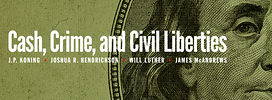Lead Essay
J. P. Koning looks at the world of high-denomination currency. Per American, there’s way more of it in circulation than even very rich Americans typically see. Much of it is undoubtedly used in crime and under-the-table transactions, which escape the tax system and impose in-effect taxes on the rest of us, who must make up the shortfall as fraudsters evade taxes. Koning proposes to issue high-value notes that would gradually depreciate as a way of tackling this tricky problem.
Response Essays
James McAndrews suggests that issuing paper money with a high but gradually decreasing value might not work out well. The demand for high-value paper is large, but much of it comes from illicit enterprises, who might be willing to use force to extract value from their clients. Confusion could lead to disuse at best and to fraud at worst. But the $100 bill isn’t worth what it used to be, and in response he suggests issuing a $200 bill.
Joshua R. Hendrickson says that maybe high-denomination notes aren’t creating externalities in the proper sense of the term. The fact that some people don’t like off-the-books transactions does not mean that they impose actionable costs on bystanders. But if we grant the claim for the sake of argument, then a two-tiered currency with depreciation of higher-denomination notes would indeed be wise.
William J. Luther argues that we shouldn’t tax currency at all. We should modestly reward holding it, through a bit of deflation. Luther doubts the extent of tax evasion and other crimes committed though the use of cash. He also argues that many prohibited uses of cash, including off-the-books employment, are ubiquitous, harmless to others, and do not merit any punishment or disincentive.
Coming Up
Conversation through the end of the month.
Related at Cato
Conference: 35th Annual Monetary Conference, November 16, 2017
Discussion: “Marijuana: An Unbanked Industry,” May 10, 2018
Briefing Paper: “Should Cryptocurrencies Be Regulated Like Securities?” June 25, 2018

